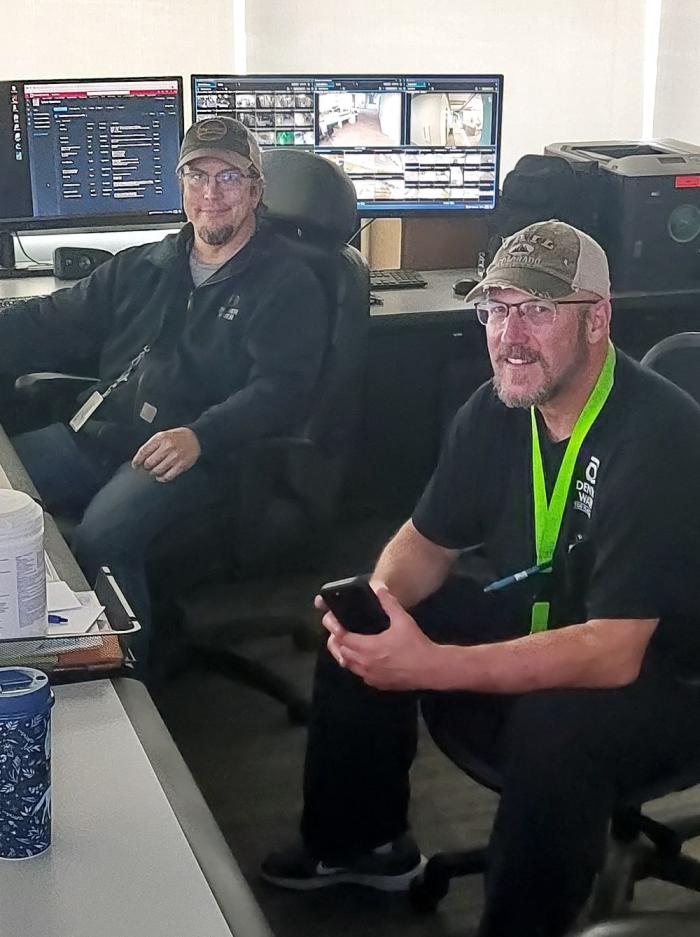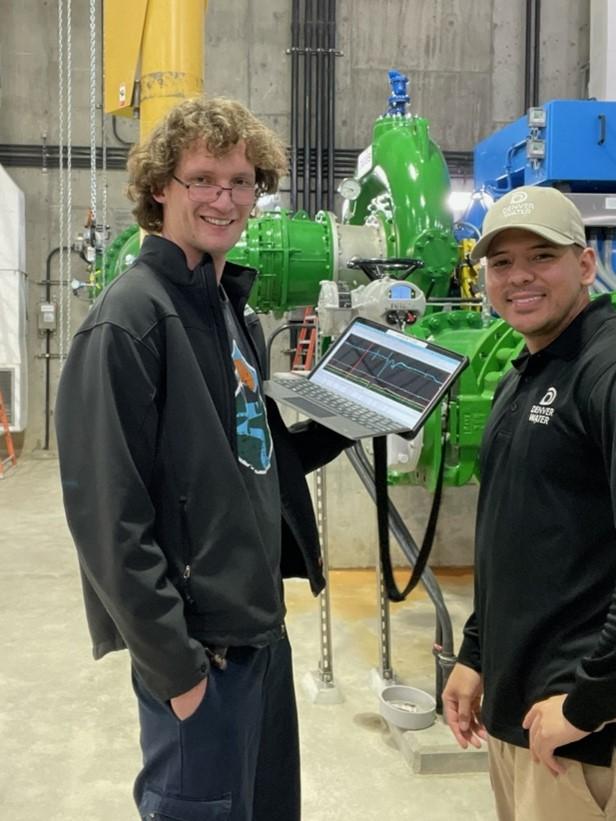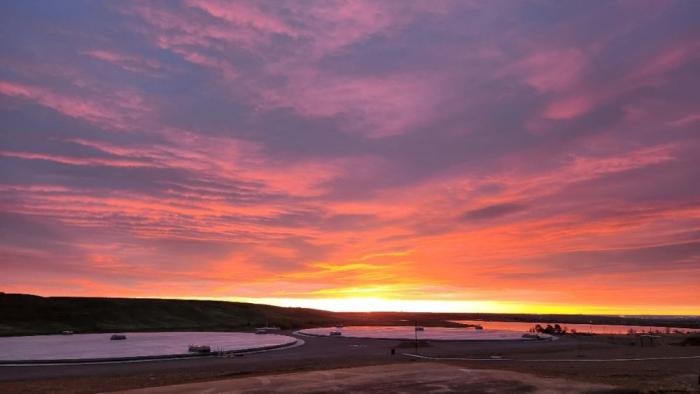From dusk till dawn: Night shift at a treatment plant
Editor’s note: This article was written by guest writer Chelsea Clark-James, a water treatment technician at Denver Water’s Northwater Treatment Plant. Her firsthand account describes what it’s like to work the night shift at Denver Water, and the teams she relies on to ensure our customers have clean, safe, high-quality water 24/7/365.
It’s another evening of traffic on I-25 as I inch along the highway with my fellow commuters. Most of them are heading home; I’m on my way to Denver Water’s new Northwater Treatment Plant.
I work the night shift there as a water treatment plant operator, and I’m one part of a vast system that ensures safe, reliable water, day and night, 365 days a year.
6 p.m.
I clock in at 6 p.m. and join the shift change meeting. This handoff between the day and night shift is crucial for ensuring smooth operations. Together, we review the important events of the day, and afterward I take time to review plant data and overall system performance to prepare for my work.
My teammates and I begin making our rounds of the plant to collect and test water samples, which we do throughout the night to ensure we continually meet safe water standards.
7 p.m.
I start at the beginning of the treatment process, where the water enters the plant, and I collect my first sample. I continue collecting water in various places throughout the water treatment process.
I take all of my samples to the on-site lab, where I test the pH, examine the sample under a microscope to look for pathogens, and conduct a variety of additional tests to ensure our treatment processes are effective and that we have high-quality, clean water. I love this part of the job — I get to see the treatment process under a microscope to make sure everything is perfect.
Join the team at denverwater.org/Careers.
The night shift isn’t a time to kick back and relax.
Sometimes a situation arises where we need support from other teams, and there are teams across the organization that also work the night shift or are available on call. If a critical sensor fluctuates, there are skilled IT technicians who can check it out. If a pump breaks, experienced mechanics are available to get back up and running.
All of us make up one of the many safeguards that ensures our system runs smoothly. And while there are fewer people during the night shift to spread the workload, knowing my team and I aren’t alone, even at night, is comforting.
For example, we have a team continually working in an area called load control. That team's job is to make sure that we have the right amount of water in our distribution system at any given time, and we frequently work with them. Based on current and projected consumption, they let us know how much water they think all of our customers will use in the morning when everyone wakes up, which informs the amount of water our treatment plants are cleaning at any given time.
To accomplish this mission, our experts in load control are continually monitoring four treatment plants, 18 pump stations, 30 treated water storage tanks, six stationary generators, two portable generators, a hydropower plant, and countless valves, pumps and other equipment.
Tom Hebert is a night supervisor in load control, and he’s experienced the unique challenges that overnight work can sometimes present.
“We investigate and troubleshoot when issues arise. At night, repairs and adjustments are prioritized differently than during the day. There’s a lot of work, day and night, that goes into making sure we have the right amount of water for our customers and balancing that with how much we have in storage,” said Hebert.
Leaks happen, even at night. See how our crews respond to water main breaks.
Midnight
Fortunately, tonight there hasn’t been any major problems, and by midnight our most rigorous lab tests are complete and logged.
It’s dinner time!
I sit down to eat and fill my water bottle from the tap. At the treatment plant, we are our own first customers; we drink the water long before it makes it to our customers’ faucets.
After dinner, I’m off to collect more data, as certain aspects of water quality must be tested and recorded every four hours. We’re low on a few lab supplies, so I reach out to an operator at another treatment plant who’s teaching me inventory management. I love that I can rely on the experience and wisdom of colleagues across the organization.
2 a.m.
My colleague has finished showing me the ropes, and it’s just after 2 a.m. Some nights I’m surprised by how quickly time goes by — there are only four hours left in my shift.
Working the night shift can be challenging. The schedule is hard on your body, it can be tough on your mental stamina and it can be difficult to balance personal commitments and relationships.
My colleague Jose Valero has worked nights for several years and has strategies for mitigating some of the impacts of working nights. He knows that caring for his body and mind directly impacts his job performance, particularly when working a night shift.
“The gym is health and knowledge is wealth,” he says. To keep his body healthy, he works out several times a week. To stay sharp, he listens to podcasts while collecting samples or doing work around the treatment plant.
For me, movement is key, and I realize I need to stretch my legs, which often means doing a walk-through of the treatment plant. This is also an important part of my job.
Discovering problems early means they are often easier to fix. Although each plant has sophisticated monitoring technology, unusual sounds or smells are indicators of potential problems — and that’s one reason it's important to have operators on-site.
4 a.m.
As I walk through the plant making observations, my co-worker calls me on the radio to report a malfunctioning pump.
At night, there isn’t a lot of additional support — like a maintenance team — to make repairs, so those tasks become my responsibility. I head to the location to assess the problem and find a burst tube. I close valves, clean up the mess from the leak and take the pump offline while my co-worker remotely activates another pump to keep the system running.
After cleaning up, I get a call on the radio that a critical sensor error has been reported. This requires specialized personnel, and thankfully we have qualified specialists on-call to help us out. It doesn’t take long for them to arrive and address the problem.
As I complete my walk-through of the treatment plant, the buildings are dark and quiet — well, relatively quiet given the machinery that is constantly running.
At this time of night, my overactive imagination kicks into high gear. Did someone just open a door? What was that sound? Did I see something moving out of the corner of my eye?
I chuckle at myself as I hurry outside in the dark on my way to the next building. Our security patrol drives by and I relax — we are not out here alone, and Denver Water takes safety and security very seriously.
5 a.m.
It's almost 5 a.m., and the eastern sky brightens. We’re excited to go home, but that doesn’t mean our night is over just yet. An alarm on the hydrogenerator goes off. We shift into troubleshooting mode.
Denver Water’s system has several hydrogenerators. The one at this location helps provide electricity for the treatment plant, while others generate excess power for the grid. This keeps our overall operating costs down and reduces our environmental impact.
Read more stories about water quality at Denver Water.
We call Denver Water's Source of Supply team. These employees work at our mountain facilities and also maintain and service all of our hydropower generators.
According to Logan Cottier, who lives and works at Denver Water’s remote Williams Fork Reservoir, responding to hydro emergencies, is not unusual, particularly during bad weather.
“The power plant at Williams Fork has a tendency to trip during inclement weather. My commute to the hydro is about 250 yards from my home — any weather and nighttime responses are extremely rapid,” he added.
Back at Northwater Treatment Plant, a team from Source of Supply has responded quickly and fixed the problem. The hydrogenerator is back up and running just in time for the shift change.
6 a.m.
Following our shift change meeting, I head out for my drive home. It’s Wednesday and the morning traffic is heavy.
I look at my fellow commuters and notice someone with wet hair after their morning shower and another drinking from a large cup of freshly brewed coffee.
I use this time to reflect on my night and my work at Denver Water.
Knowing that I am safeguarding the water my friends, family and fellow Denverites drink helps me balance the challenges of working nights, and the experience gained working at an organization like Denver Water keeps me moving forward.







